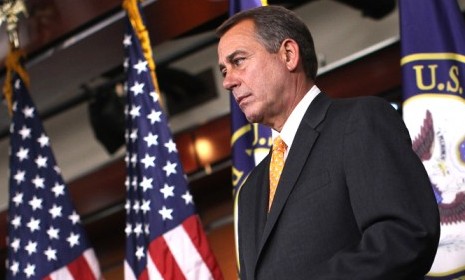Could 'gridlock' be good for America?
With the GOP in control of the House and Democrats in charge of the Senate, a partisan stalemate is all but inevitable. Could there be an upside?

A free daily email with the biggest news stories of the day – and the best features from TheWeek.com
You are now subscribed
Your newsletter sign-up was successful
"Welcome to gridlocked America," writes Ezra Klein at The Washington Post. While the GOP has won a landslide victory in the House of Representatives, the Senate is still under Democrat control — with Harry Reid hanging on as majority leader. All of that means that it's going to be very difficult for any legislation to make it onto the U.S. books for the next two years, says Klein. "From the perspective of actually getting anything done in the next two years, there was perhaps no worse outcome." But is that necessarily a bad thing? The pundits weigh in:
Not doing much could be the best recipe: Gridlock "may not matter," says The Associated Press. In fact, it "may not be such a bad policy for the economy." Economists agree that "none of the ideas proposed in the campaign — by either party — would make a big dent" in unemployment figures or jolt consumer confidence. If the economy is left to recover on its own — without unnecessary government spending — it might happen more quickly.
"Stalemate in Congress might not be bad for economy"
The Week
Escape your echo chamber. Get the facts behind the news, plus analysis from multiple perspectives.

Sign up for The Week's Free Newsletters
From our morning news briefing to a weekly Good News Newsletter, get the best of The Week delivered directly to your inbox.
From our morning news briefing to a weekly Good News Newsletter, get the best of The Week delivered directly to your inbox.
We need legislation now more than ever: Burying our heads in the sand will not help fix our economy, says Mohamed A. El-Erian at The Washington Post. The problems we face stem from "years of over-leverage and misplaced confidence" in borrowing — not meddling government. The private sector cannot deal with the burden of our national debt. We need a healthy government to provide "long-term solutions" to housing reform, deficit restructuring, and pro-growth tax reforms.
"We've voted. What's next for the economy?"
It's almost like having a small government: The coming "two glorious years of hyper-partisan, acrimonious gridlock" are exactly what's required, says David Harsanyi at Reason. If you hadn't noticed, the electorate has angrily voted "against activist government," and this stalemate may be the one thing that can replicate the benefits of small government. Finally Washington will be in its "most moral and productive state." What a relief.
A free daily email with the biggest news stories of the day – and the best features from TheWeek.com
-
 Political cartoons for February 16
Political cartoons for February 16Cartoons Monday’s political cartoons include President's Day, a valentine from the Epstein files, and more
-
 Regent Hong Kong: a tranquil haven with a prime waterfront spot
Regent Hong Kong: a tranquil haven with a prime waterfront spotThe Week Recommends The trendy hotel recently underwent an extensive two-year revamp
-
 The problem with diagnosing profound autism
The problem with diagnosing profound autismThe Explainer Experts are reconsidering the idea of autism as a spectrum, which could impact diagnoses and policy making for the condition
-
 The billionaires’ wealth tax: a catastrophe for California?
The billionaires’ wealth tax: a catastrophe for California?Talking Point Peter Thiel and Larry Page preparing to change state residency
-
 Bari Weiss’ ‘60 Minutes’ scandal is about more than one report
Bari Weiss’ ‘60 Minutes’ scandal is about more than one reportIN THE SPOTLIGHT By blocking an approved segment on a controversial prison holding US deportees in El Salvador, the editor-in-chief of CBS News has become the main story
-
 Has Zohran Mamdani shown the Democrats how to win again?
Has Zohran Mamdani shown the Democrats how to win again?Today’s Big Question New York City mayoral election touted as victory for left-wing populists but moderate centrist wins elsewhere present more complex path for Democratic Party
-
 Millions turn out for anti-Trump ‘No Kings’ rallies
Millions turn out for anti-Trump ‘No Kings’ ralliesSpeed Read An estimated 7 million people participated, 2 million more than at the first ‘No Kings’ protest in June
-
 Ghislaine Maxwell: angling for a Trump pardon
Ghislaine Maxwell: angling for a Trump pardonTalking Point Convicted sex trafficker's testimony could shed new light on president's links to Jeffrey Epstein
-
 The last words and final moments of 40 presidents
The last words and final moments of 40 presidentsThe Explainer Some are eloquent quotes worthy of the holders of the highest office in the nation, and others... aren't
-
 The JFK files: the truth at last?
The JFK files: the truth at last?In The Spotlight More than 64,000 previously classified documents relating the 1963 assassination of John F. Kennedy have been released by the Trump administration
-
 'Seriously, not literally': how should the world take Donald Trump?
'Seriously, not literally': how should the world take Donald Trump?Today's big question White House rhetoric and reality look likely to become increasingly blurred